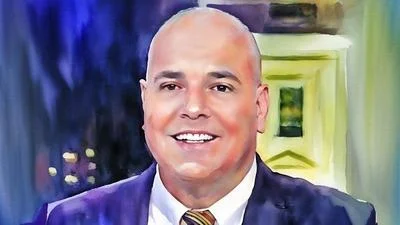This transcript has been edited for length and clarity.
Tim Jackson was the head of the Colorado Auto Dealers Association. He is also the former Colorado state director for the National Federation of Independent Business.
Federal Newswire
What’s the title of your new book?
Tim Jackson
Dude, Where's my Flying Car? They're actually coming faster right now than I would have imagined. Local governments and some state governments, and to some degree the federal government, are making it harder for people to buy, own, and drive cars. They're not adding capacity even as an area grows, even as the highway gets busier.
The projections over the next 20 to 30 years are that vehicle miles traveled will more than double. It has actually tripled in the last 50 years. Obviously, we're not keeping up with capacity.
Federal Newswire
With people moving out of cities, what do you see happening?
Tim Jackson
I've watched what's happening in DC…They've done the same thing there that they're doing in Denver and other metro areas. They're making it harder for people to buy, own, drive, and park cars. They're making it impossible to park downtown or making it [very] expensive. They're taking lanes away to dedicate to bus lanes or to dedicate to bike lanes.
Federal Newswire
What’s going on with “flying cars,” or personal aircraft?
Tim Jackson
There are over 200 companies right now trying to get off the ground with flying cars, and not all of them will make it. Most of them probably won't, but I've moved from a skeptic to a believer. They will happen.
I've moved from if they will happen to when they will happen.
Federal Newswire
How are the aviation and automotive industries working this out?
Tim Jackson
The aviation industry has been under pressure–so have the automotive, trucking, shipping, and railroad industries–to become zero-emission. Frankly, the automotive sector has done better at that than most, but it still has a long way to go.
From a percentage standpoint it's in single digits. The aviation industry is not even in it at all yet. eVTOLs [flying vehicles] are where the
automotive and aviation industries intersect. The aviation industry is really looking at these vehicles to be their answer for zero emission, but they are short-range vehicles.
Federal Newswire
Where do things stand with passengers for airborne vehicles?
Tim Jackson
eVTOLS are coming into the space from 22 different startup companies. [I have a chapter for each in my new book].
[I]n the 1900 to 1920 timeframe there were 2000 automakers. 125 years later, there are effectively fewer than 25 that produce 98% of the cars aside from China, and China is very heavily engaged in the retail industry as well as the flying cars.
Almost all of these are going to be helicopter-like with multiple props… urban air mobility. Once the confidence builds where people can see they are airworthy, then they are a viable alternative to taking an Uber, Lyft, or taxi. I think we'll all want to do it.
Federal Newswire
What kind of infrastructure would be required to service a new generation of personal vehicles?
Tim Jackson
Services will be needed on the ground at an airport, called FBOs [or] fixed base operators. Think of an FBO at a regional airport as a service station. Archer Aviation, which is one of the rising stars in this new industry…has already contracted for FBO services all across the US. Some of those are network services.
One is called Atlantic Aviation and one is called Signature Aviation. Those are the two largest FBO operators in the US, and they're already contracted for services with Archer Aviation in Abu Dhabi.
You would take off from a pad. The first destinations are going to be prominent destinations like airports. While there, [the vehicles] will be plugged into a charger and the batteries will charge like some of the fast cars.
Federal Newswire
How are these companies managing to avoid errors in the air?
Tim Jackson
In the US we're killing 40 to 50,000 people on our roads every year. I'm not blaming the car companies, and I'm not blaming the regulators or the cars. Oftentimes it's driver error. To put it in perspective, the high watermark was 1972 and it was 52,000. Today it's about 42,000. We're off about 20%, but that doesn't tell the whole story, because between then and now we have increased the vehicle miles traveled by 300%, and it's a whopping number of 1.1 trillion miles traveled nationally in the US.
Is 42,000 too many? Yes, it's too many, but at least we're going in the right direction.
Let's go to aviation fatalities...There has not been a commercial aviation fatality here in the United States since 2009. It's been 15 years. I think it's important to get that on the table when you're talking about safety because people want these vehicles to be safe.
The day one of these falls out of the air and kills some people is the day that company is either out of business or the industry is shut down. We've seen it in autonomous rideshare.
Federal Newswire
Will these vehicles be restricted to certain airways or corridors?
Tim Jackson
There will be designated corridors. Those have not yet been established by the FAA, but it is on their plate to do. Even if it's pilot driven or autonomous, there will be corridors. I'm often asked, “well, if we've filled up the 405 freeway around L.A. will we fill up the sky the same way?”
If you watch a drone show like a 4th of July or a New Year's Eve drone show, you have thousands of drones interacting together…remote control or autonomous. Not only are they staying in the air and not running into each other, they're literally moving and keeping their shape …through their aerial motions, so it can be done.
We're not going to fly them that [tight]. But, that shows we could fly them that tight and still be safe.
Federal Newswire
What else do you cover in your new book?
Tim Jackson
Amazon drone deliveries: first off, let's say it hasn't happened as fast as Jeff Bezos promised it would happen when he appeared on 60 Minutes about five years ago and said, “hey, we're going to start delivering packages by drone.”
Why would Jeff Bezos and Amazon want to [do this] with their package deliveries? Because they want to alleviate the traffic congestion, the emissions, and the gridlock.
But then I'm often asked, “well, do they work?” To the extent that they're doing them now and again, that hasn't rolled out as fast as he wanted. Walmart is test marketing those, in and around Dallas. So, if you order a package on Walmart.com, you can push the button and have it delivered by drone.
As I've told my audiences, if they were dropping packages on runners, pedestrians, cyclists, windshields of cars, or in the middle of intersections, we would be hearing about it. Since they're not doing that, I think they're working.









